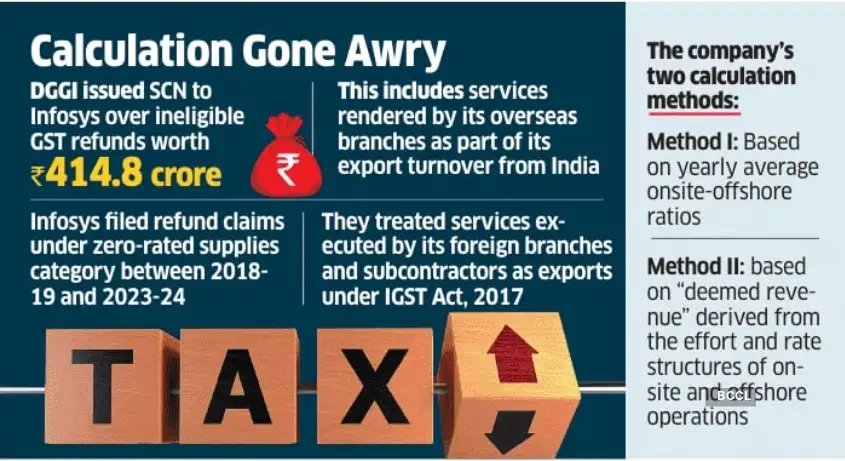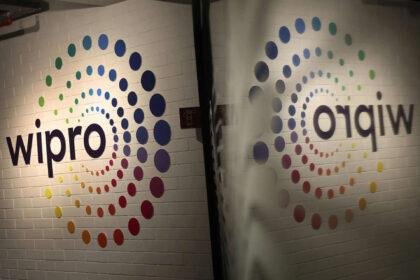Infosys Faces ₹414.88 Crore Showcause Notice Over Alleged GST Refund Irregularities
Overview of the Allegations
In a significant development for the Indian tech giant Infosys, the Directorate General of GST Intelligence (DGGI) has issued a showcause notice alleging that the company improperly claimed refunds of input tax credit (ITC) amounting to ₹414.88 crore. This notice pertains to the period between 2018-19 and 2023-24, raising questions about the company’s compliance with the Goods and Services Tax (GST) regulations.
The DGGI’s investigation was initiated following intelligence reports suggesting that Infosys had included services rendered by its overseas branches and subcontractors in its zero-rated export turnover. This practice, if proven true, would mean that the company availed itself of excess refunds under Section 54 of the Central GST Act, 2017.
The Context of GST and Zero-Rated Supplies
To understand the implications of this case, it is essential to grasp the fundamentals of the GST framework in India. Introduced in July 2017, the GST regime aimed to streamline the taxation process and eliminate the cascading effect of taxes. Under this system, zero-rated supplies refer to goods or services that are taxed at a rate of 0%. While suppliers do not charge GST on these supplies, they are entitled to claim refunds on the input tax credit related to the costs incurred in providing these services.
For a company like Infosys, which derives nearly 97% of its revenue from exports, the ability to claim refunds on ITC is crucial for maintaining its competitive edge in the global market. However, the DGGI’s findings suggest that the company may have misinterpreted or misapplied these regulations, leading to inflated refund claims.
Details of the Investigation
According to documents reviewed by the Economic Times, the DGGI’s investigation revealed that Infosys filed multiple refund claims across various GST registrations during the specified period. The company categorized these supplies as outward taxable supplies (zero-rated) and sought refunds of accumulated ITC under Rule 89 of the CGST Rules, 2017, in conjunction with Section 20 of the IGST Act, 2017.
The crux of the DGGI’s allegations lies in the assertion that Infosys claimed refunds for services that were not genuinely exported. Specifically, the investigation pointed to work performed by the company’s overseas branches and subcontractors on client projects located abroad. This raises a critical question: Did Infosys misclassify these services to benefit from the zero-rated supply provisions?
Internal Classifications and Their Implications
The DGGI’s probe also delved into Infosys’s internal terminology, which distinguishes between ‘Onsite’ and ‘Offshore’ work. ‘Onsite’ refers to tasks executed at a client’s location outside India, while ‘Offshore’ pertains to work completed within the company’s Indian development centers. The DGGI alleges that Infosys included the value of services rendered by its overseas branches and subcontractors in its export turnover, thereby inflating its refund claims on zero-rated supplies.
This classification system is not unique to Infosys; many multinational corporations employ similar terminologies to delineate between different types of work. However, the DGGI’s findings suggest that Infosys may have crossed a line by including non-exported services in its claims, potentially violating GST regulations.
The Broader Implications for the IT Sector
The allegations against Infosys come at a time when the Indian IT sector is under scrutiny for various compliance issues. As one of the largest software services firms in the country, Infosys’s practices could set a precedent for how other companies approach GST compliance. The outcome of this investigation may influence not only Infosys but also the broader industry, prompting firms to reassess their tax strategies and compliance measures.
Moreover, the case highlights the ongoing challenges faced by businesses in navigating the complexities of the GST framework. While the intent behind GST was to simplify taxation, the reality has often been a labyrinth of rules and regulations that can lead to unintentional missteps.
Infosys’s Response and Future Steps
As of now, Infosys has not publicly commented on the DGGI’s showcause notice. The company will likely need to mount a robust defense to address the allegations and clarify its position regarding the claimed refunds. This situation presents an opportunity for Infosys to demonstrate its commitment to compliance and transparency, which are increasingly important in today’s business environment.
The company may also consider engaging with tax experts and legal advisors to navigate the complexities of the case. A proactive approach could help mitigate potential penalties and restore confidence among stakeholders, including investors and clients.
Conclusion
The issuance of a ₹414.88 crore showcause notice to Infosys by the DGGI marks a critical juncture for the company and the Indian IT sector as a whole. As the investigation unfolds, it will be essential to monitor how Infosys responds to these allegations and what implications this case may have for the broader industry. The outcome could serve as a cautionary tale for other firms navigating the intricate landscape of GST compliance, emphasizing the need for diligence and transparency in tax matters.











